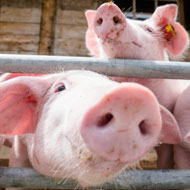Faster diagnosis for oedema disease a possibility

The study involved 20 pigs from 14 commercial farms from which faecal swabs were subjected to the PCR test.
Scientists in Germany have conducted a study on the PCR test to see if there is a faster way to diagnose oedema disease in pigs.
The study involves taking samples direct from the faeces instead of waiting for post-mortem tests on tissues.
According to veterinary surgeon Dr Vera Gotter from IDT Biologica, early results are ‘promising', and could lead to a quicker, easier - and possibly cheaper - method of diagnosing the disease in the future.
“The PCR tests from faeces could make the analysis of the disease quicker and less expensive because the piglets would not have to be submitted to a post-mortem examination anymore,” explains Dr Gotter.
“The test is not 100 per cent accurate but neither are the current ones. While the initial results are promising they should not be over-estimated. Further studies involving more pigs should be carried out.”
The study involved 20 pigs from 14 commercial farms from which faecal swabs were subjected to the PCR test. This was then compared with the results from histopathology involving samples from the brain, spinal cord and intestine.
Oedema disease is an often-fatal disease that occurs primarily in recently weaned pigs. It is caused by certain serotypes of E.coli bacteria that produce a powerful toxin and is difficult to diagnose on farm.



 The Federation of Independent Veterinary Practices (FIVP) has announced a third season of its podcast, Practice Matters.
The Federation of Independent Veterinary Practices (FIVP) has announced a third season of its podcast, Practice Matters.